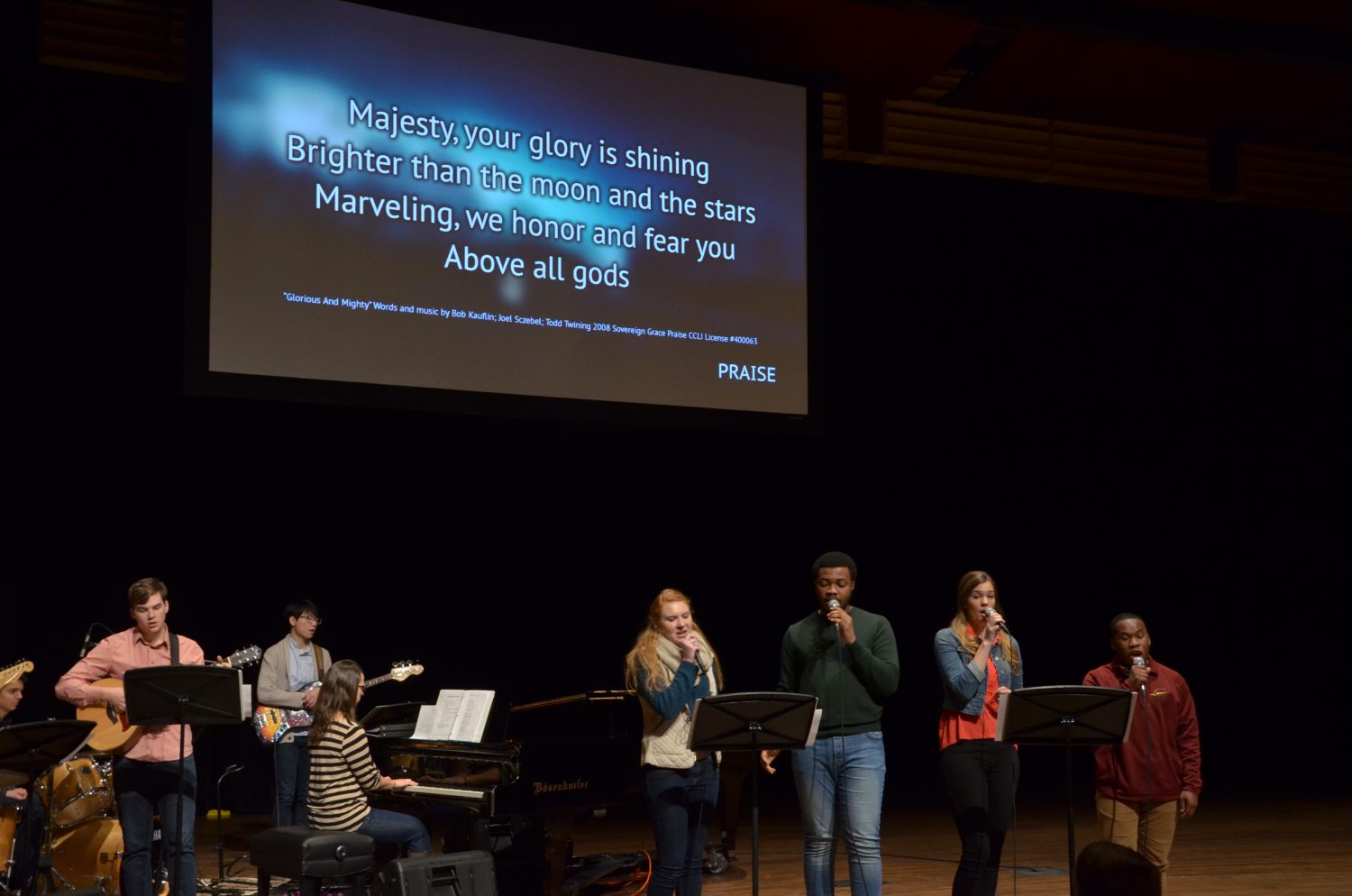Each year, at the precipice of the second semester, campus ministries hosts ReGathering — a time for students to come together in reunion with the Calvin community. It is a time, specifically, for students who may have studied abroad during the fall semester or over interim to be formally welcomed back to campus. It is a time for transfer students to be officially grafted into the Calvin family. It is a time for all Calvin students to remember and reflect on the responsibility and joy of learning. It is a time for all to be invigorated by a proper posture of worship and remember the particular attentiveness required for the studies that lie ahead in the coming semester.
As students entered the CFAC auditorium, they were welcomed by instrumental music from the band on stage and a flood of familiar faces offering hugs and reunions. After a brief video introduction from President LeRoy, who could not be present due to his participation in a coalition of Christian educators in Washington, D.C., the band lead the nearly full auditorium in two songs.
Chaplain Mary Hulst welcomed the crowd and explained that ReGathering also functions as the introduction to the second semester Bible study: Apologetics, the practice of defending one’s faith; the task of giving reason for one’s beliefs. She explained that: “There are people we are in relationship with that do not have faith. And we, ourselves, have great doubt at times.” She affirmed that, “we are not alone in wanting to speak with people who are not believers. We are not alone in wanting to deepen our faith.”
This new campus study is a chance to learn how best to fulfill the call Christians have received in 1 Peter 3:15, which states: “in your hearts honor Christ the Lord as holy, always being prepared to make a defense to anyone who asks you for a reason for the hope that is in you.”
Pastor Mary then welcomed Rev. Dr. Laura Smit, a professor in the religion department and the morning’s keynote speaker. Professor Smit undertook the task of explaining the gravity and responsibility of living out the 1 Peter 3:15 call.
Professor Smit explained that, because the verse commands Christians to be ready to give an answer, it is important to remember that, in this verse, Christians are called to make a defense, not advance on offense. She explained that, in these contexts, the fulfilment of this verse most often comes in the form of answering questions, not explicit proclamation of the gospel.
Within this framework, Professor Smit explained that Christians should not prepare to answer specific questions worded in specific ways, but rather, Christians should prepare to answer general categories of questions, and those questions can be categorized by generation.
Professor Smit claimed that members of the baby boomer generation tend to ask questions like “what is true?” Members of generation X tend to ask questions like “what is real” or “authentic?” Millennials ask questions like “what is good?” And the generation after millennials ask questions like “what is beautiful?”
Professor Smit explained that there is a rich history of Christians in contact with truth, reality, goodness and beauty, and a rich history and practice of connecting these things back to Christ.
According to Professor Smit, the best thing a Christian can do in this conversation is to affirm the fact that, at times, it can be easier to pretend to be true, real, good and beautiful than it is to reconcile with one’s own sin and need for redemption. These can be hard conversations. Professor Smit explained that “[Christians] are not in these conversations to win arguments, [they] are in these conversations to win hearts. And [they] can begin to win hearts by introducing them to Jesus.”
Professor Smit advised that the conversations Christians are called to engage are hard and deep conversations. They are not lead conversations; they are earned conversations. They are conversations one has when one has been granted enough trust to share.
Professor Smit remarked that because these conversations are conversations of defense not offense, they require a posture of humility. “There was a time when Christians controlled culture. We are not in those times. Praise God we are not in those times.” She commented on the blessing of being in a place of weakness, culturally: “When we are weak, we are strong.” From a place of weakness, Christians can be non-threatening. The truth of the Gospel can be better heard and understood from this posture, according to Smit.
Professor Smit closed with the charge to “Embrace weakness, suffering and foolishness. Be bold to have the conversations God is preparing for us.”








